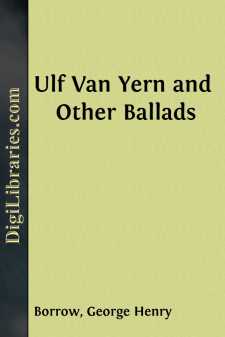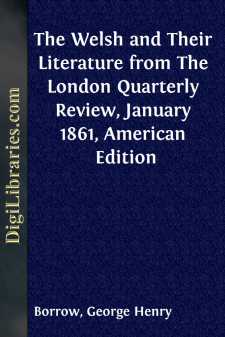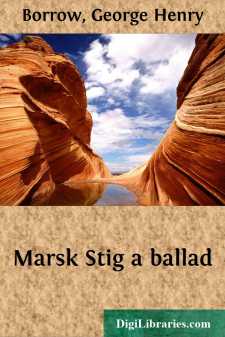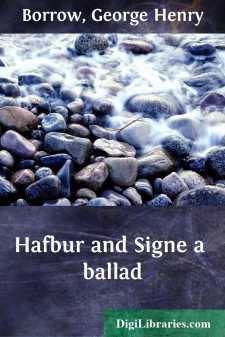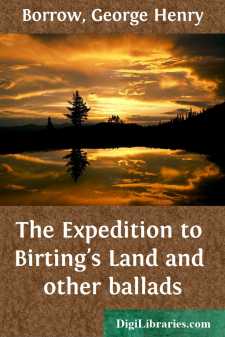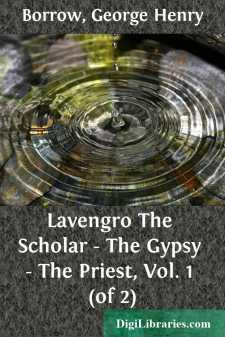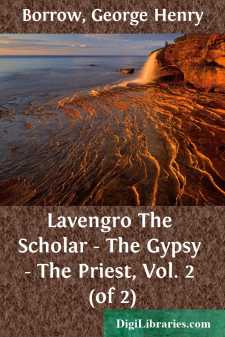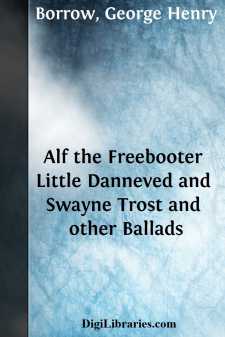Categories
- Antiques & Collectibles 13
- Architecture 36
- Art 48
- Bibles 22
- Biography & Autobiography 813
- Body, Mind & Spirit 142
- Business & Economics 28
- Children's Books 15
- Children's Fiction 12
- Computers 4
- Cooking 94
- Crafts & Hobbies 4
- Drama 346
- Education 46
- Family & Relationships 57
- Fiction 11829
- Games 19
- Gardening 17
- Health & Fitness 34
- History 1377
- House & Home 1
- Humor 147
- Juvenile Fiction 1873
- Juvenile Nonfiction 202
- Language Arts & Disciplines 88
- Law 16
- Literary Collections 686
- Literary Criticism 179
- Mathematics 13
- Medical 41
- Music 40
- Nature 179
- Non-Classifiable 1768
- Performing Arts 7
- Periodicals 1453
- Philosophy 64
- Photography 2
- Poetry 896
- Political Science 203
- Psychology 42
- Reference 154
- Religion 513
- Science 126
- Self-Help 84
- Social Science 81
- Sports & Recreation 34
- Study Aids 3
- Technology & Engineering 59
- Transportation 23
- Travel 463
- True Crime 29
George Henry Borrow
George Henry Borrow (1803-1881) was an English author known for his travel literature and novels, most notably "The Bible in Spain" and "Lavengro." His works often drew on his extensive travels across Europe and his deep interest in the Romani people and their culture. Borrow's unique storytelling combined his personal adventures with rich cultural and linguistic observations, making his writings a significant contribution to 19th-century literature.
Author's Books:
Sort by:
ULF VAN YERN It was youthful Ulf Van Yern Goes before the King to stand:“To avenge my father’s death Lend me warriors of thy band.” “Of my kemps I’ll lend thee them Who to follow thee consent;Ask’st thou Vidrik Verlandson Thou wilt further thy intent. “I will lend thee of my men, Thou shalt have the very flower;Vidrik, and stark Diderik, Many kemps have felt their...
more...
The Welsh style themselves Cymry or Cumry, a word which, in their language, means a number of people associated together. They were the second mass of population which moved from Asia into Europe. They followed and pushed forward the Gael or Gauls; were themselves impelled onward by the Slowaks or Sclavonians, who were themselves hunted, goaded, and pestered by a wild, waspish race of people,...
more...
SONG THE FIRST. Up Riber’s street the dance they ply, The Castle’s won, the Castle’s won!There dance the knights most merrily, For young King Erik Erikson. On Riber’s bridge the dance it goes, The Castle’s won, the Castle’s won!There dance the knights in scollop’d shoes, For young King Erik Erikson. ’Twas Riber Wolf the dance who led, The Castle’s won, the...
more...
PART I. Marsk Stig he out of the country rode To win him fame with his good bright sword;At home meantide the King will bide In hope to lure his heart’s ador’d. The King sends word to the Marshal Stig That he to the fields of war should fare;Himself will deign at home to remain And take the charge of his Lady fair. In came the Marshal’s serving man, And a kirtle of green that...
more...
HAFBUR AND SIGNE Young Hafbur King and Sivard King They lived in bitter enmity;’Twas Signe proud that caused their feud, Of maidens all the fairest she. It was youthful Hafbur King Awaked at midnight with a bound,And full of dread he straightway said His wondrous dream to all around. “Methought I was in heaven’s domain, Within that place so fair to view,And held to my breast...
more...
THE EXPEDITION TO BIRTING’S LAND The King he o’er the castle rules, He rules o’er all the land;O’er many a hardy hero too, With naked sword in hand. Let the courtier govern his steed, The boor his thatchèd cot,But Denmark’s King o’er castles rules, For nobler is his lot. King Diderik sits on Brattingsborg, And round he looks with pride:“No one I know of in the...
more...
There have been many Romany Ryes, or “Gypsy Gentlemen,” as Gypsies designate those who, though not of their race, yet have loved that race, and have mastered the Romany tongue. The first is one of the oddest—Andrew Boorde (c. 1490-1549). Carthusian, traveller, physician, and, perhaps, the original Merry Andrew, he got into trouble over certain delinquencies, and died a prisoner in the Fleet...
more...
CHAPTER XLIX Singular Personage—A Large Sum—Papa of Rome—We are Christians—Degenerate Armenians—Roots of Ararat—Regular Features. The Armenian! I frequently saw this individual, availing myself of the permission which he had given me to call upon him. A truly singular personage was he, with his love of amassing money, and his nationality so strong as to be akin to poetry. Many an...
more...
INTRODUCTION The tale of Yvashka; or, Jack with the Bear’s Ear, is a great favourite in Russia. Its main interest depends not so much on him of the Bear’s Ear, or even his comrade, Moustacho, who angles for trout with his moustaches, as on Baba Yaga. This personage is the grand mythological demon of the Russians, and frequently makes her appearance in their popular tales, but perhaps in none...
more...
Song the First Sir Alf he is an Atheling,Both at Stevn and at Ting. Know ye little Alf? Alf he builds a vessel stout,For he will rove and sail about. Alf he builds a vessel high,The trade of pirate he will try. He draws on the sand a circle mark,And with a bound he gained the bark. Upon the prow Alf foremost stood,And Copenhagen’s koggers view’d. O’er the wide sea he flung a look,He knew the...
more...


